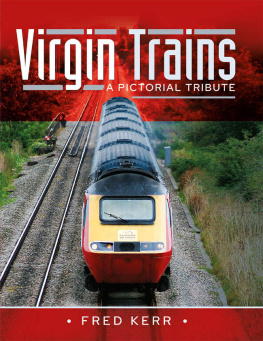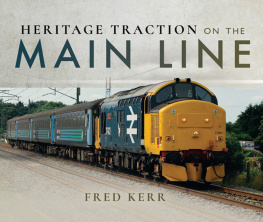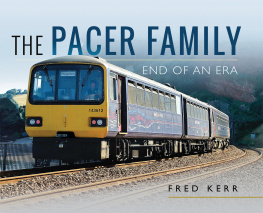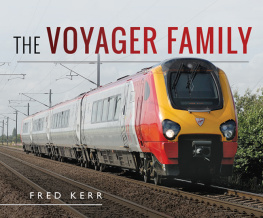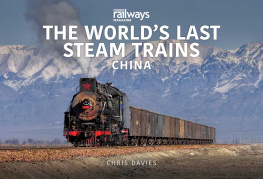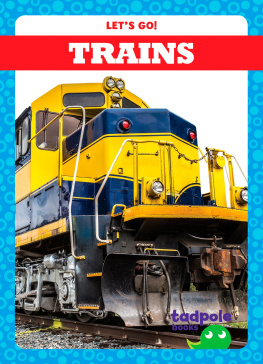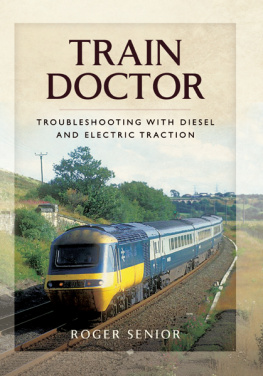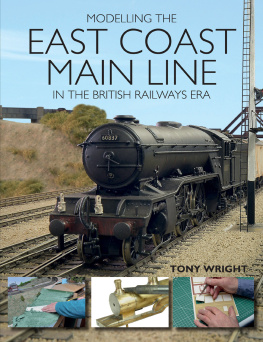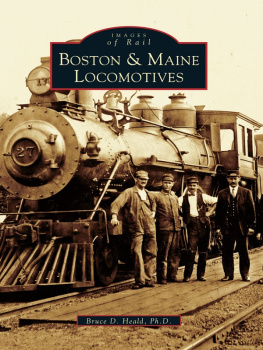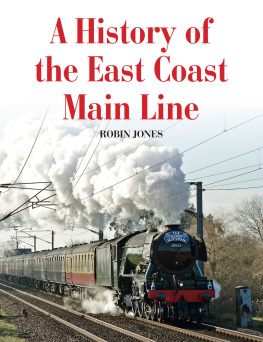Pagebreaks of the print version

VIRGIN TRAINS
A PICTORIAL TRIBUTE
Front Cover: An unidentified power car powers through Defford on 28 September 2003 whilst leading the final HST-operated Penzance-Glasgow Central service .
Rear Cover: Between 1997 and 2007 the main West Coast Main Line route was shared by both Virgin Cross Country and Virgin West Coast franchises as noted on 26 January 2005 when a Class 220 Voyager trainset heading north out of Preston was viewed from St Michaels church tower when passing a southbound Class 390 Pendolino trainset approaching Preston station .
VIRGIN TRAINS
A PICTORIAL TRIBUTE
FRED KERR
First published in Great Britain in 2022 by
Pen and Sword Transport
An imprint of
Pen & Sword Books Ltd.
Yorkshire Philadelphia
Copyright Fred Kerr, 2022
ISBN 978 1 52679 331 7
eISBN 978 1 52679 332 4
The right of Fred Kerr to be identified as Author of this work has been asserted by him in accordance with the Copyright, Designs and Patents Act 1988.
A CIP catalogue record for this book is available from the British Library.
All rights reserved. No part of this book may be reproduced or transmitted in any form or by any means, electronic or mechanical including photocopying, recording or by any information storage and retrieval system, without permission from the Publisher in writing.
Pen & Sword Books Ltd incorporates the imprints of Pen & Sword Books Archaeology, Atlas, Aviation, Battleground, Discovery, Family History, History, Maritime, Military, Naval, Politics, Railways, Select, Transport, True Crime, Fiction, Frontline Books, Leo Cooper, Praetorian Press, Seaforth Publishing, Wharncliffe and White Owl.
For a complete list of Pen & Sword titles please contact
PEN & SWORD BOOKS LIMITED
47 Church Street, Barnsley, South Yorkshire, S70 2AS, England
E-mail:
Website: www.pen-and-sword.co.uk
or
PEN AND SWORD BOOKS
1950 Lawrence Rd, Havertown, PA 19083, USA
E-mail:
Website: www.penandswordbooks.com
ACKNOWLEDGEMENTS
M y thanks go to: Ron Cover and Richard Tuplin for images as noted in the text; and to Tony Miles for clarifying the confused franchise arrangements that applied throughout the period to the various bodies. Any errors, however, remain mine hence any corrections to the author should be directed through the publishers in the first instance.
INTRODUCTION
W hen British Railways (BR) was privatised in April 1994 under the Railways Act 1993, the Virgin Rail Group (VRG) was one of the many companies that submitted bids to operate the new franchises which had been created for the various groups of services that had previously been part of BRs national network. The company had been incorporated by Virgin Group in 1997 to bid for the first tranche of franchises, and it was successful in gaining those for the Inter City Cross Country and Inter City West Coast services. The Inter City Cross Country franchise was awarded in November 1996 to run from January 1997 until March 2007 and began operating as Virgin Cross Country (VCC) from 5 January 1997 until November 2007 whilst the Inter City West Coast franchise was awarded in January 1997 to run from March 1997 until March 2012 and began operating as Virgin Trains (VT) from 9 March 1997.
The Virgin Group subsequently sold 49 per cent of its VRG shares to the Stagecoach Group in October 1998, resulting in the franchises becoming joint Virgin Rail Group/Stagecoach operations albeit with Virgin branding. Whilst both franchises were operated by separate companies, they shared some of the routes hence some of the rolling stock was common to both, but each franchise award included a requirement to purchase new trainsets. VCC ordered a fleet of diesel-powered trainsets whilst VT ordered a fleet of electric-powered tilting trainsets; both orders were introduced to service from 2001. In 2006 both franchises were restructured, including the transfer of the Birmingham New St-Glasgow/Edinburgh services to the Inter City West Coast franchise and VRG was asked for proposals to operate the revised franchises. Those for the Inter City West Coast franchise were accepted by the Department of Transport (DfT) but it rejected those for the Inter City Cross Country franchise hence put it out to open tender. VRG lost the Cross Country franchise to Arriva Trains which began operating it from 11 November 2007.
When the Inter City West Coast franchise came up for renewal in 2012 the VRG bid was unsuccessful and the franchise was awarded to First Group but it was appealed by VRG leading to the DfT cancelling the award on the grounds that it had discovered significant technical flaws in the franchise process. The DfT proposed a fresh competition but, in the meantime, awarded VT a series of management contracts until a revised franchise was awarded to a joint bid from First Group and the Italian national train operator Trenitalia that began on 8 December 2019.
VRG was involved with further franchise bids that were unsuccessful until November 2014, when its joint bid with Stagecoach Group for the Inter City East Coast franchise proved successful and, despite only being partner for ten per cent, the new franchise began operating as Virgin Trains East Coast (VTEC) from 1 March 2015 for an eight-year period. VTEC quickly identified problems with the franchise and relinquished it on 23 June 2018, to leave the Inter City West Coast franchise as VRGs only rail interest within the United Kingdom.
The development of a High Speed 2 line (HS2) to ease demand on the West Coast Main Line (WCML) had seen the DfT restructure the Inter City West Coast franchise to include HS2 to become a West Coast Partnership (WCP) franchise and sought tenders from interested parties.
VRG once more joined a consortium comprising Stagecoach Group and the French national train operator SNCF to bid for the franchise; the bid was led by Stagecoach Group but it was removed by the DfT when Stagecoach Group objected to some of the franchise terms. The WCP franchise was finally let to the First Group/Trenitalia bid to start from 8 December 2019 thus leaving VRG with no involvement in running UK rail services.
This album seeks to show the history of the Virgin Rail Groups involvement with the UKs privatised railway and show the changes made in the rolling stock fleets during its time operating the franchises they held whilst recording the changes imposed on the franchise agreements and the consequences for both franchisees and its services.
Fred Kerr
Southport
April 2022
SECTION 1: VIRGIN CROSS COUNTRY
T he Inter City Cross Country franchise was awarded to VRG by the Office of Passenger Rail Franchising (OPRAF) in November 1996 and a new subsidiary company called Cross Country Trains Ltd, trading as Virgin Cross Country, was created to operate the services from 5 January 1997 until 10 November 2007. During the franchise period, Railtrack entered administration and was replaced by Network Rail whilst the franchise role of OPRAF was assumed by the Strategic Rail Authority (SRA) which had come into existence on 1 February 2001 under the aegis of the Transport Act 2000. The failure of Railtrack to provide the infrastructure to permit the Inter City West Coast franchise to operate 140mph services led the SRA to suspend both VRG franchises in favour of Management Contracts in July 2002. The SRA was later abolished by the Transport Act 2005 and its functions were transferred to the Department for Transport (DfT) on 1 December 2006.

